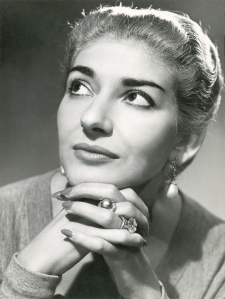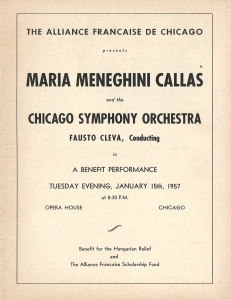You are currently browsing the tag archive for the ‘Karl Böhm’ tag.
____________________________________________________

Maria Callas (Angus McBean photo)
Maria Callas was scheduled to appear with the Chicago Symphony Orchestra at the Civic Opera House on January 15, 1957, in a benefit concert sponsored by the Alliance Française de Chicago for Hungarian relief following the recent Soviet invasion. Karl Böhm was to conduct, and the program would include several opera arias and a few orchestral selections.
However, as reported extensively in the press, there were several disputes between Callas and Böhm, and they were unable to come to an agreement regarding the program. Four days before the concert, it was announced that Böhm had withdrawn, having “reached a stalemate in program arrangements with the soprano.” Fausto Cleva, a house conductor at the Metropolitan Opera, was quickly engaged as his replacement; Callas arrived in Chicago three days before the concert, but by some accounts was more than two hours late for the first rehearsal.
The concert was notable for a variety of reasons. “Returning to the still reverberating scene of her American opera debut [in the title role of Bellini’s Norma in November 1954] to sing her first American concert on that same Civic Opera House stage, she knew the audience was wondering what really had happened to that stratospheric voice, of late winning headlines for the wrong reasons,” wrote Claudia Cassidy in the Chicago Tribune. “So she took that voice, rammed it down their throats, and looked justifiably triumphant when they cheered.”
Cleva and the Orchestra began the concert with Rossini’s Overture to Semiramide, and Callas performed arias from Bellini’s Norma and La sonnambula, Donizetti’s Lucia di Lammermoor, Meyerbeer’s Dinorah, and Verdi’s Il trovatore (not all of the program is confirmed, as there are discrepancies between the program book and newspaper accounts). Near the end of the first half of the program, “Callas showed her mettle. She put down her bouquet, rested a foot on the podium, folded her arms, and sang ‘In questa reggia’ from Puccini’s Turandot, [which] as all operagoers know, is plain dynamite,” continued Cassidy. “It meant that a superb singer who is also an artist, and so doubly valuable, sang that cold, cruelly beautiful aria with every ounce of strength she could summon, driving it like nails into the consciousness of the audience. It was not beautiful, for it was forced to a degree altogether perilous to the human voice so mistreated. But it was, for sheer courage and determination, for winning at all costs, magnificent.”
Callas returned for another Alliance Française benefit the following year on January 22, 1958, again performing with the Orchestra at the Civic Opera House. Nicola Rescigno conducted.
This article also appears here.
Here in the Archives, we frequently receive donations of old program books and occasionally, the programs are a little extra special when they contain annotations from their original owner. Just today we received a small collection from an anonymous donor, and a few of our favorites are below (click on the image for a larger view). Priceless.
Guest conductor Ernest Ansermet led concerts in January 1954 that included Schumann’s First Symphony, Debussy’s Clouds and Festivals from Nocturnes, Honegger’s Fifth Symphony, and Falla’s Three Dances from The Three-Cornered Hat: “The Honegger was terrifying! Thank the Lord that Ansermet had the good sense to not end the program with it. If I ever hear that damn Schumann again I’ll go nuts. What nonsense it is.”
The second program is from a March 1954 concert that included Joseph Szigeti as soloist in Tartini’s Concerto for Violin in D minor and Bartók’s First Portrait. Fritz Reiner, still in his first season as music director, also conducted Mendelssohn’s Ruy Blas Overture, the CSO’s first performances of Alvin Etler‘s First Symphony, Tommasini’s arrangement of Scarlatti’s ballet suite from The Good-Humored Ladies, and Sibelius’s Swan of Tuonela from Four Legends of the Kalevala and Alla Marcia from the Karelia Suite: “I can’t remember when I changed my mind so much about the merits of a work during its performance as I did during the premiere of Etler’s Symphony. I want very much to hear it again. Though I suspect it has no ‘guts,’ I also suspect it may have a long life. Szigetti [sic] was quite wonderful in the Bartók and Tartini. Reiner was better than I have ever heard him but Lord how uninspiring and competent he is.”
In February 1956, Karl Böhm was in Chicago to lead the Orchestra in Weber’s Overture to Der Freischütz, Richard Mohaupt’s Town Piper Music, and Bruckner’s Seventh Symphony: “Karl Böhm was excellent; made a lasting impression. The Bruckner was magnificent!”
And finally, Igor Stravinsky was guest conductor in January 1954, leading his Divertimento The Fairy’s Kiss, the Capriccio for Piano and Orchestra (with his son Soulima Stravinsky as soloist), and suites from Petrushka and The Firebird: “A chaste, perilously classical, yet exciting performance. S[travinsky] took six bows—a real ovation. I could not help but lean over the gallery and shout: ‘Keep Reiner on vacation!'”







